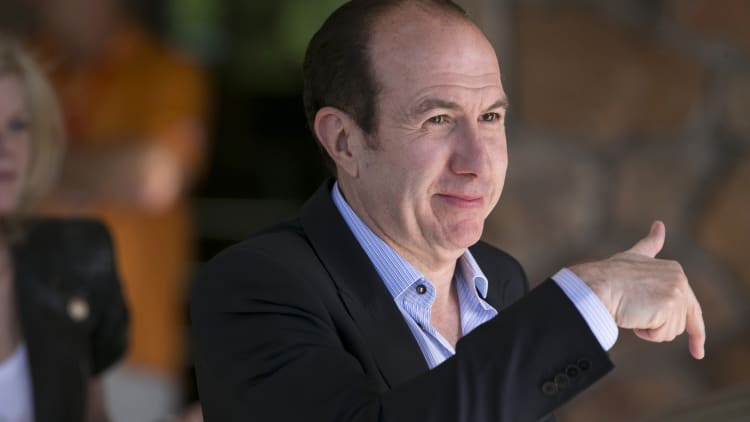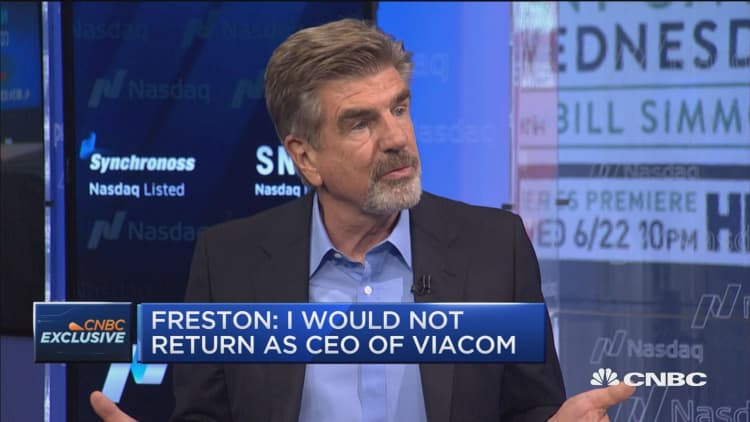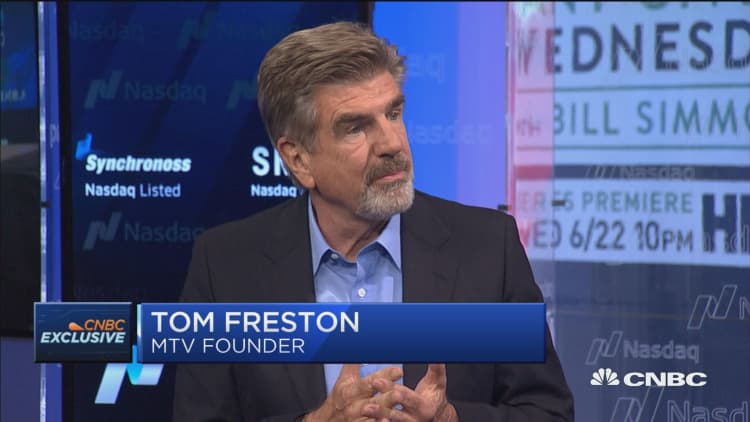


Nearly a decade after being ousted as CEO of Viacom, Tom Freston has harsh words for the company's current management.
"There's been a series of pretty serious errors" at the company, Freston said Wednesday on CNBC's "Fast Money."
When it comes to Philippe Dauman, CEO and chairman of Viacom, Freston said Wednesday that he agrees with the perception of some that he is an arrogant elitist who is ill-suited to run the media giant.
"I don't think he's been the optimal leader for the company," Freston said. "The right guy for a job like that in a company that's steeped in the popular culture with young audiences, the person who owns that chair should be somebody who is turned on, attracted to and somewhat knowledgeable about the popular culture and what's going on there." Dauman also "has a reputation of not being a great listener," Freston added.
When it comes to the company's board, he said it has been "complicit in the inactivity of Viacom. ... I don't know that the board is a board that's really in touch with the world that Viacom's viewers live in."
Dauman and Shari Redstone, the daughter of controlling shareholder and former chairman Sumner Redstone, are currently embroiled in a high-stakes legal battle over control of the 93-year-old media mogul's companies.
For his part, Freston said he's friendly with Shari Redstone, but indicated that she hasn't offered him anything for his negative words about Dauman — "she doesn't even know I'm on TV," he said.
And no matter what the next episode of the Redstone-Dauman soap opera brings, one thing is clear: Today's Viacom appears a far cry from the company Freston helped build.
The roots of MTV
"I want my MTV!"
These four simple words came to represent more than just an iconic marketing campaign. Rather, they defined what a generation of kids wanted during the '80s and '90s: A one-stop shop for music and television.
That's where Freston came in.
As one of the founders of MTV networks (and the person who is credited with coining the aforementioned phrase), Freston helped build a revolutionary vertical that caught the attention of America's youth well before the days of social media.
"Viacom isn't beyond repair," Freston said of MTV's parent company in a phone interview with CNBC. "But the wrong leadership is in place."
In a statement to CNBC, a Viacom spokesperson wrote in part that "Viacom is significantly bigger, more global and generates far more profits today than when Philippe Dauman's predecessor left office in 2006."
Since Freston's ouster, as well as a plethora of lawsuits, bad press, lost talent and internal battles, Viacom stock has wallowed near five-year lows. However, to Freston, all this could have been avoided if creativity, not arrogance, had remained the company's core trait.
The key to Viacom's success
Freston explained that his early triumphs in network television stemmed from pushing those around him to take risks and to always think creatively.
This attitude enabled original programming such as "Behind the Music" and "The Real World" to eventually blossom and gave artists like Michael Jackson, Madonna and Prince a national stage at early points in their careers.
MTV was also where Judd Apatow interned and where Jon Stewart and Ben Stiller learned the ropes of show business before heading on to stardom.
"They were just kids hanging out," Freston said of Apatow, Stewart and Stiller. "I wanted to assemble a creative hothouse. We gained a competitive advantage by pushing the envelope, and I encouraged the interns and the executives to think of themselves as a motorcycle gang with the goal of reinventing television for young people."
That gang's success caught the attention of Redstone, who has been credited with coining the phrase "content is king" and believed that MTV had the tools to successfully attract a wide-ranging demographic of male and female viewers.
"Sumner reached out to me and I needed capital, so I invited him to come by to see what we were working on," said Freston, who at the time was running MTV on what he described as a shoestring budget. "Sumner came by the MTV office with shaving cream in his ear and took a look around and decided he liked what we had."
After that meeting with Freston, Redstone set his sights on Viacom, MTV's parent company. Following a hostile takeover in 1987, Redstone gained control of Viacom and empowered Freston as chairman and CEO of MTV Networks.
"We had great years together. Up until 2004, we had quarter-to-quarter growth every quarter for MTV," said Freston. In the same period, Freston would launch VH1, Comedy Central and Nickelodeon. "I had free rein to be creative and Sumner appreciated my process."
Fired by Redstone
In 2005, Redstone pushed hard for Viacom to acquire MySpace, but Freston had other ideas.
"I met with Mark Zuckerberg and offered him $750 million for his company that same year," said Freston, who had just been named Viacom's CEO at the time. "He said no."
Freston notes that he always viewed Facebook as the crown jewel within the world of social media. Freston added that soon after his initial offer, Yahoo and Microsoft made bids in excess of $1 billion for ownership of Facebook.
When Rupert Murdoch's News Corp. purchased MySpace for $580 million in 2005, Redstone was enraged. Subsequently, there was a major decline in Viacom's stock and Freston's fate was sealed. Soon after, Redstone named attorney and confidant Dauman as CEO of Viacom.
Of course, News Corp. went on to sell MySpace for $35 million in 2011. Facebook launched its IPO the following year and is now valued at $350 billion.
Culture clash
From Comedy Central's ability to provide a fresh outlet for up-and-coming comedians to VH1 unveiling the truth, grit and brilliance behind artists such as Bob Marley and John Lennon, Viacom's properties were once the envy of mainstream television networks. Today, Freston says Viacom now represents a real-life soap opera that revolves around an island of misfit executives for whom creating content is secondary.
Freston cited numerous missteps under Dauman, including a $1 billion lawsuit against Google-owned YouTube for copyright infringement in 2007.
"Viacom got nothing out of that lawsuit and they effectively isolated themselves from the digital world," said Freston. "They ultimately set a tone that they were not ready for the future of digital."
The lawsuit was later dismissed and then settled following multiple appeals.
"The company has generated billions of dollars in new distribution revenues from emerging digital platforms while at the same time more than doubling affiliate revenues since 2006," the Viacom spokesperson wrote to CNBC.
Freston was also critical of Viacom for allowing relationships with key creators to deteriorate.
"Viacom has no regard for relationships with talent, which is where the content comes from. The value system has changed," said Freston, who noted that John Oliver, Jon Stewart and Stephen Colbert all left Comedy Central in a span of months. He also believes that "South Park" creators Trey Parker and Matt Stone are unhappy with the network.
Lastly, Freston said Dauman was ill-advised to sell an ownership stake in Vice back to Shane Smith. "In 2006, Dauman let a key piece of Vice go for $3 million," Freston said. "Today, the whole brand is worth $4.5 billion. Furthermore, had Dauman kept that piece of Vice, they would have had a much-needed platform in the digital world. They'd have a home for the Nickelodeon graduates."
Freston's fresh start
Ultimately, Freston envisions a successful second act for Viacom.
That means a new CEO because, according to Freston, "Dauman is focused on stocks, lawsuits and leveraging nickels from customers. The original Viacom model was turned upside down once Philippe came in."
Writes the Viacom spokesperson: "Philippe has doubled the amount of investment in creative programming over his tenure to more than $6 billion annually, and has grown Viacom to be the #1 family of cable networks and the #1 destination on all of television for reaching younger audiences. .... Viacom is making more global hits than ever before."
Today, Freston serves on the board for Vice Media, a platform he thinks that Viacom could have become with the right model in place.
"Vice has taken the old Viacom playbook and built a great youth media business for today's world," said Freston, who believes Vice's suite of channels that include food, sports and news verticals is prime for continued growth.
Freston's success today is also highlighted by philanthropic work with Bono. Soon after leaving Viacom, Freston was named chairman of the One campaign, which focuses on eliminating poverty and AIDS in Africa. In a 2013 Vanity Fair piece, Bono described Freston as genius with "the innovative leadership and the structures that are necessary for creative people to succeed."
Additionally, Freston serves on the board of DreamWorks Animation and is a principal for Firefly3, a New York media consulting firm.
Freston insists he would not return to Viacom as CEO if offered the job.
"I built Viacom brick by brick, but I'm happy with the path I'm on. I wish them luck."



